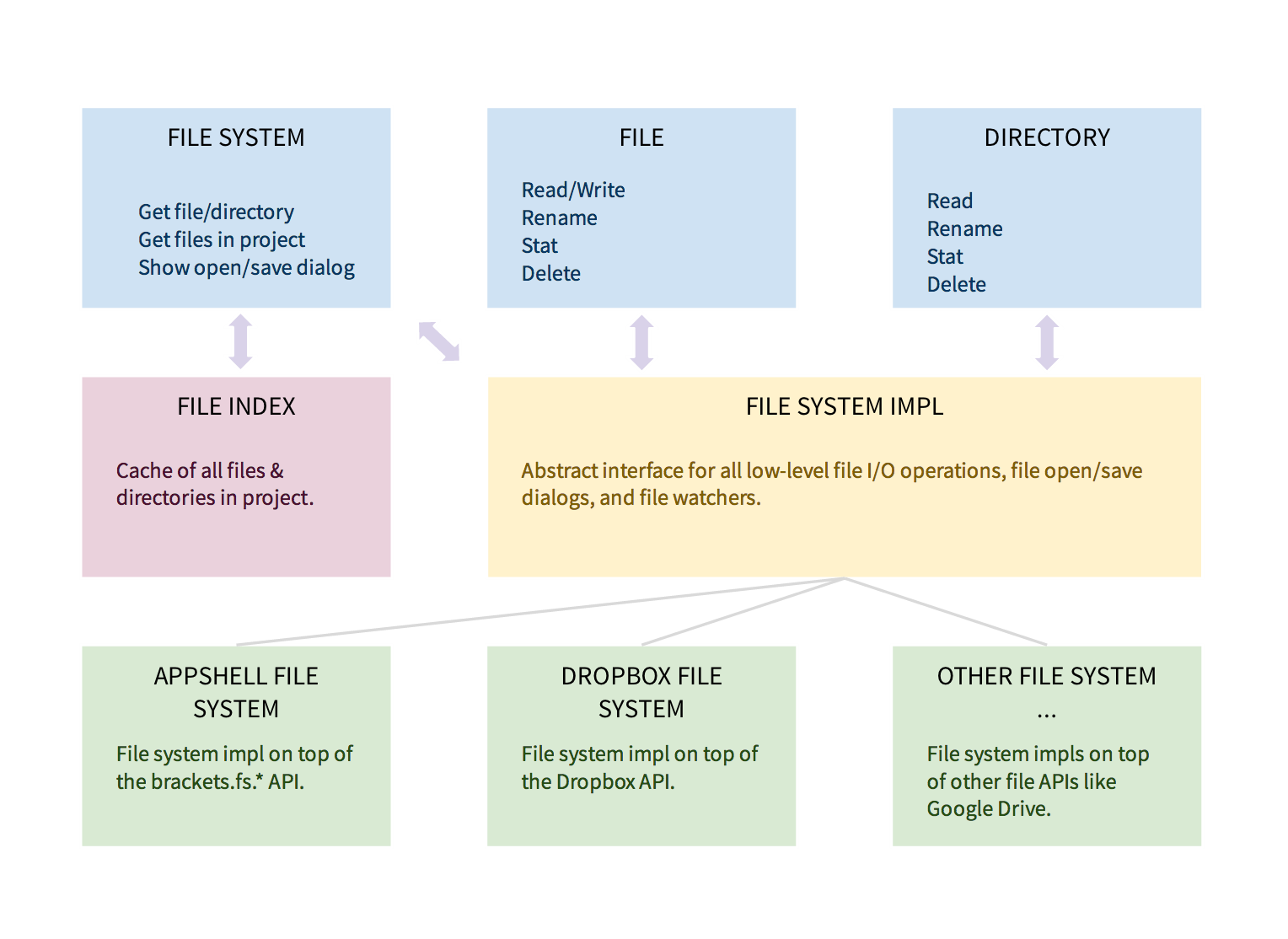File System
Landed in Brackets Sprint 34!
The old file system APIs in Brackets were a bit chaotic, and usage was inconsistent. Here are just a few issues:
- No centralized file system model. This makes it difficult to add file watchers, and update all file references in the app after operations like rename.
- Inefficient. We constantly hit the disk to read timestamps, content, etc.
- Two APIs for file i/o:
brackets.fsandNativeFileSystem - Incorrect creation of
FileEntryobjects (these should never be directly instantiated) - No way to use alternate storage--Dropbox, Google Drive, etc.
For more background, read this forum post.
The high-level goals of the new file system are:
- Clean, consistent API.
- Unified file system model, including file watchers.
- High Performance. Only hit the disk when we need to.
- Ability to swap out low-level I/O routines (for cloud storage, etc.).
Here is a block diagram of the major parts:

Clients only interact with the blue boxes. The green boxes represent low-level file i/o implementations, which can be added as extensions. The red box replaces the old FileIndexManager functionality, and does not have a public API (indexed files are accessed through FileSystem).
There are a few basic rules for using the new file system.
- Persist full pathnames, but convert into
FileandDirectoryobjects for in-memory use. CreatingFileandDirectoryobjects is cheap so there is no need to worry about performance. - Paths use
/separators regardless of platform. Paths begin with/on Mac/Linux andc:/(or similar) on Windows. FileSystem normalizes paths to guarantee that paths to a directory always end in a trailing/. - There is a forced 1:1 relationship between
FileandDirectoryobjects and their representation on disk. If two pieces of code ask theFileSystemfor the same file path, they will both be returned the sameFileobject. - Listen for
"change"events onFileSystemto be notified of file or directory changes. - When caching file (or directory) related data, you should use the file.id property as the key, and not the file.fullPath. The path of a file is subject to change if any of its parent directories are renamed.
##API##
For a guide to converting from current Brackets file APIs to these new APIs, see File System API Migration.
The main module is FileSystem. This is the public API for getting files and directories, showing open/save dialogs, and getting notified about file system changes.
###FileSystemEntry###
This is an abstract representation of a FileSystem entry, and the base class for the File and Directory classes. FileSystemEntry objects are never created directly by client code. Use FileSystem.getFileForPath(), FileSystem.getDirectoryForPath(), or Directory.getContents() to create the entry.
/src/filesystem/FileSystemEntry.js
###File###
This class represents a file on disk (this could be a local disk or cloud storage). This is a subclass of FileSystemEntry.
###Directory###
This class represents a directory on disk (this could be a local disk or cloud storage). This is a subclass of FileSystemEntry.
##Performance & Caching## The main performance gains come from caching. The file system provides two caching levels:
- File contents & metadata - reads are guaranteed to be up to date. Caches may be used to reduce bandwidth, but we always ping the impl and wait to ensure the cached copy is the latest.
- Directory structure / file listing - reads are fast, but may not reflect external changes quickly. Cached info is returned immediately without waiting for the underlying storage impl.
In both cases, changes made via the file system's own APIs are always reflected immediately (as soon as the operation's callback signals success).
##Change Events##
FileSystem dispatches a "change" event whenever a file or directory changes on disk. This event is passed an entry parameter, which loosely describes the type of change:
- a
Fileobject - the file's contents have changed - a
Directoryobject - one or more of the directory's immediate children have been created, deleted, renamed/move, or otherwise changed. (This could include a subdirectory being created/deleted, but not changes to items within a subdirectory). -
null- a "wholesale" change has occurred and listeners should assume everything in the file hierarchy may have changed
For external changes, there may be a significant delay before a "change" event is dispatched (file watchers may be unreliable or laggy). But changes made via the file system's own APIs dispatch a "change" event immediately, after the operation in question finishes running its callback.
Note: It's always fine as a (less-performant) shortcut to treat change notifications as if they were less fine-grained. For example, the prototype refreshes the entire folder tree view whenever any Directory is passed with a change event. This is overkill, but simpler to implement than only refreshing the affected part of the tree.
##Performance Numbers## Performance numbers between the old file system and new file system.
Note: These are the baseline numbers that do not include file caching or file watchers.
| test | old file system | new file system | difference |
|---|---|---|---|
| Open File | 194ms | 182ms | 6.5% improvement |
| Load Project | 631ms | 705ms | 12% regression |
| Find in Files | 2749ms | 1568ms | 43% improvement |
| JS Code Hints | 61ms | 63ms | 3% regression |
| Quick Open | 55ms | 64ms | 15% regression |
| Memory Usage | 39MB | 37.4MB | 3% improvement |